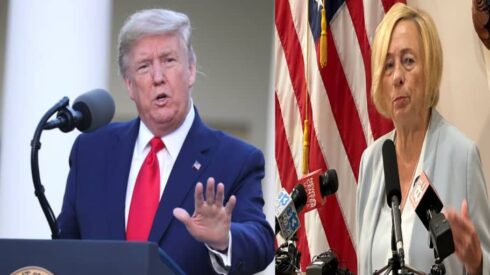President Donald Trump has issued a strong ultimatum to the state of Maine, threatening to withhold federal funding unless Governor Janet Mills issues a personal apology. The demand follows a series of political confrontations between Trump and the Democratic governor, particularly over election policies and immigration enforcement. Trump, who remains a dominant force within the Republican Party, insists that Mills’ past comments and actions were disrespectful and warrant a public retraction.
This latest development adds fuel to an already contentious relationship between the president and state leaders who have opposed his policies. Trump’s threat has raised concerns over the potential economic impact on Maine, a state that relies heavily on federal support for infrastructure, healthcare, and disaster relief. While some Republican allies back his stance, critics argue that conditioning federal aid on personal grievances is an abuse of power that undermines democratic governance.
The Root of the Conflict: What Triggered Trump’s Demand
The tension between Trump and Governor Mills dates back to his presidency, but recent events have reignited their political feud. Mills has been an outspoken critic of Trump’s influence on national politics, particularly his continued claims about election fraud and his hardline stance on immigration. Her administration has actively resisted efforts to implement Trump-backed policies, drawing sharp criticism from the president.
The tipping point appears to have been Mills’ remarks at a recent public event, where she reportedly criticized Trump’s leadership style and his approach to governance. Trump, known for his combative rhetoric, responded by demanding a formal apology, framing it as a matter of respect and political decorum. His threat to withhold federal funds is seen by many as an unprecedented move, raising legal and ethical questions about the limits of political retaliation.
Federal Funding at Risk: What Maine Stands to Lose
Maine receives billions of dollars in federal funding annually, supporting critical programs in education, healthcare, infrastructure, and social services. If Trump were in a position to influence or block these funds, it could have severe consequences for the state’s economy and residents. Medicaid funding, disaster relief assistance, and transportation projects could all face significant delays or reductions, disproportionately affecting low-income communities.
Local officials and policy analysts warn that even the perception of federal funds being used as political leverage could create instability. Businesses that rely on federally backed projects may hesitate to invest in Maine, fearing uncertainty in government support. While Trump currently lacks the executive authority to unilaterally cut funding, his influence within the Republican Party means that future GOP-led administrations could revisit the issue if Mills does not comply with his demands.
Political Reactions: Supporters and Critics Weigh In
Trump’s ultimatum has drawn mixed reactions from political leaders across the country. His supporters argue that he is justified in demanding respect from state officials who publicly undermine his leadership. Some conservative figures have praised his willingness to take a hardline approach, framing it as a necessary pushback against what they see as liberal overreach.
However, Democratic leaders and even some moderate Republicans have condemned Trump’s approach, calling it an abuse of power and a dangerous precedent. Legal experts argue that federal funding is allocated based on need and policy priorities, not personal vendettas.
Legal and Constitutional Challenges: Can Trump Withhold Funds
The legal grounds for Trump’s threat are highly questionable, as federal funds are typically distributed based on congressional appropriations and agency regulations. Legal experts argue that any attempt to withhold funding as a form of political retribution would likely face immediate court challenges. Past Supreme Court rulings, such as those limiting the executive branch’s ability to withhold funds from sanctuary cities, indicate that such actions could be deemed unconstitutional.
Moreover, constitutional scholars warn that allowing political leaders to condition federal aid on personal grievances could set a dangerous precedent. If Trump—or any future president—were able to arbitrarily cut funding to states based on political disagreements, it could erode the foundational principles of federalism and equal representation. As a result, even if Trump’s threat is largely rhetorical, it raises critical concerns about the intersection of politics and governance.
The Bigger Picture: A Test of Political Power and Federal Authority
The standoff between Donald Trump and Governor Mills is more than just a personal dispute—it is a reflection of the broader tensions shaping American politics. If Trump’s demand for an apology leads to actual attempts to withhold federal funding, it could set a dangerous precedent where political leaders use financial leverage to punish opposition. Such a shift would challenge the fundamental principles of federal governance, raising concerns about the balance of power between the executive branch and state governments.
Beyond Maine, this situation signals a growing trend of using political influence to pressure state leaders into compliance. With Donald’s potential return to office looming, similar conflicts may arise between his administration and Democratic-led states that resist his policies. The outcome of this confrontation will not only impact Maine’s financial stability but could also define the limits of political power in the years ahead. Whether this remains a rhetorical battle or escalates into a legal and financial showdown, the implications will be felt far beyond Maine’s borders.














